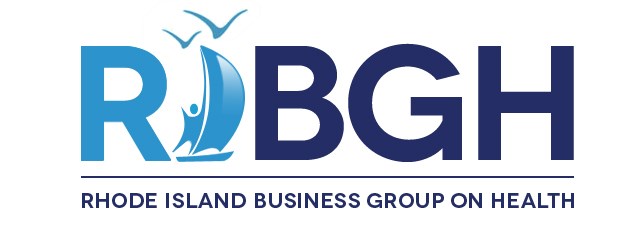
The RIBGH is committed to keeping our membership informed with the most up-to-date and relevant resources to help manage the ever-changing landscape of COVID-19. Below, we have compiled information, no-cost tools, and resources employers can use and share with their employees.
RIBGH COVID-19 Employer Webinar Series
Supporting Employees in Post-COVID-19 Workplace 5/28/2020
The American work environment as we previously knew it, is over. Leadership styles and how employees relate to work will be continuously evolving as we move forward. Supporting employees during and after a large society shift will be the next focus.
The Cost Impact of COVID-19 6/11/2020
How will COVID-19 impact your health insurance costs in 2020 and beyond? Don't miss your chance to gain insights from USI’s regional and national leaders on this question many leaders are now asking.
Creating A Recovery-Friendly Workplace 6/16/2020
Establishing a recovery-friendly workplace (RFW) is a critical step in helping your employees stay well and safe as we navigate through this changing time.
The Post-COVID Explosion in Medical Spending 6/25/2020
Join the RIBGH and bestselling author, Al Lewis for a timely discussion on managing post-Covid medical spending.
Managing Cyber Risks With a Remote Workforce Start Date: 7/15/2020
Join security law and cybersecurity professional, Linn Freedman, and Donald Nokes, president of Rhode Island-based IT company NetCenergy for a timely discussion to help you prevent cybersecurity attacks during this time of transition.
Reducing Transmission Among Employees
Interim Guidance for Businesses and Employers to Plan and Respond to Coronavirus Disease 2019 (COVID-19) from the CDC
The following interim guidance may help prevent workplace exposures to COVID-19, in non-healthcare settings. (CDC has provided separate guidance for healthcare settings.) This guidance also provides planning considerations for community spread of COVID-19. Updates as of March 21 include:
- Updated cleaning and disinfection guidance
- Updated best practices for conducting social distancing
- Updated strategies and recommendations that can be implemented now to respond to COVID-19
Choosing Wisely Resources for Employers
Choosing Wisely in the Face of COVID-19 for Employers
Discussions include:
- How employees and their families can partner with their doctors through shared decision making on care decisions related to to Covid-19 using the Choosing Wisely 5-Question Framework
- Real data and information that can help employers better manage and communicate the impact of COVID-19 to their workforce
Benefit and Policy Resources
The National Alliance of Healthcare Purchaser Coalitions' Coronavirus Town Hall, Benefits and Policy Directions - March 26, 2020
Check out results from the National Alliance of Healthcare Purchaser Coalitions' Employer COVID-19 survey. Click here to listen to the webinar recording.
Coronavirus Aid, Relief, and Economic Security (CARES) Act: What Employers Need to Know
Employee Mental Health in the Age of COVID-19
Caring for employee mental health: a coronavirus guide
The virus has sent shockwaves through industry and economy alike, but its real impact has been on people. So how should business leaders be looking after employees during the coronavirus outbreak? And how can they prioritize their mental health and wellbeing?
Now that we're working from home it's important that we all take time to understand that we can become more lonely and make efforts to reach out and talk to one another and take time to have conversations about things other than work.
National Alliance of Healthcare Purchaser Coalitions, May 20, 2020 from 1:00 PM to 2:00 PM (ET).
Choosing Wisely Resources for Physicians and Healthcare Workers
New England Journal of Medicine Podcast featuring a discussion with Dr. Anthony Fauci, the head of the National Institute of Allergy and Infectious Diseases, about how to talk with patients about COVID-19.
University of Pittsburgh Medical Center Newsletter Article detailing how they promoted better blood management practices to avoid unnecessary transfusions - an issue of particular importance given widespread concerns about blood shortages in our current environment.
Virginia Mason Medical Center Case Study describing their reduced use of antibiotics for viral respiratory infections, including offering nurse phone care instead of office visits for patients. Perhaps some of their insights can be used in helping your staff triage COVID-19 concerns from patients.
Mayo Regional Hospital in Maine's "Wellness Bags" describes another approach to antibiotics. Read about how this strategy
reduced the use of antibiotics. We've heard from partners, who use a similar approach, that they have added CDC patient tips for COVID-19 to these types of packets for patients coming in with concerns about the virus.
Kognito Modules provide guidance on how to help patients and clinicians have better conversations about whether antibiotics are necessary.
Preparing for Reopening
American Enterprise Institute's National Coronavirus Response a Road Map to Reopening: this report not only provides a road map for navigating through the current COVID-19 pandemic in the United States, but also outlines specific directions for Phase II when they are able to safely diagnose, treat, and isolate COVID-19 cases and their contacts. During this phase, schools and businesses can reopen, and much of normal life can begin to resume in a phased approach.
Testing isn't perfect but could add to the arsenal of weapons against the virus, which include requiring workers to wear gloves and face masks, and increasing social distancing when applicable.
As many states begin to reopen - most without meeting the thresholds recommended by the White House - a new level of COVID-19 risk analysis begins for Americans.
Employers could find themselves deep in litigation for refusing to let some employees stay home once coronavirus shelter-in-place orders are lifted.
The American work environment as we previously knew it, is over. Leadership styles and how employees relate to work will be continuously evolving as we move forward. Supporting employees during and after a large society shift will be the next focus. RIBGH, Thursday, May 28, 9:00 am - 10:00 am.
Resources From our Membership
USI
This 28-minute on-demand webinar presented by Mike Sicard, USI’s CEO, covers important guidance for creating a 4-step Essential Return to Work Plan:
• Preparing the work force – Employee considerations and implementing a
phased-in return strategy
• Preparing the workspace – Protocols for safely reopening facilities (including
potential employee testing) and OSHA risk classifications
• Managing a physical distancing environment – Including a multi-point plan for
implementation
• Adapting your strategy – Staying responsive as medical advances develop in
testing, treatment, and prevention
This 18-minute on-demand webinar presented by Arthur Hall, USI’s National Employee Benefits Practice Leader, covers specific testing and other strategies for protecting employee health.
Mercer
Financial Implications of COVID-19
Employer Town Hall on COVID-19: Financial Impact of COVID-19 - This town hall included an open discussion with a diverse panel on the current and future financial impact of COVID-19 to plan sponsors and other healthcare stakeholders. National Alliance of Healthcare Purchaser Coalitions, May 14, 2020
Societies of Actuaries Research Brief Impact of COVID-19 - This COVID-19 impacts brief from the Societies of Actuaries predicts a major increase in health care costs as a result of increased demand for a limited supply of testing kits, medical equipment, hospital beds, and hospital rooms. The hospital supply chain is at risk because international delivery services have been limited. Pharmacies, hospitals, and other heath care providers depend on the transportation of drugs from international manufacturing sites. With a limited supply of these drugs, pharmaceutical costs are expected to increase. Economists also predict global economic growth to slow to as low as 1.5% and expect 2020 Gross Domestic Product (GDP) for high GDP countries to be reduced by 1.0%.
The Potential National Health Cost Impacts to Consumers, Employers, and Insurers Due to the Coronavirus (COVID-19) - Covered California discusses the potential impacts of current circumstances during the COVID-19 Pandemic on consumers, employers, and insurers. Current cost barriers are leading to consumers' inability to afford coverage and treatment. Employers' inability to offer affordable coverage is leading costs to shift to employees. In the insurance market, unsubsidized marketplace enrollees are being priced out; and small insurers closing due to insolvency is damaging insurance market competition.
Estimating the Impact of COVID-19 on Healthcare Costs in 2020 - According to this Milliman report COVID-19's impact on healthcare costs, commercial and Medicare payers are likely to see a decrease in costs. However, Medicaid payers will potentially experience net increases due to the increase in unemployment and Medicaid enrollment. Due to deferred care and increased demand, overall 2020 medical costs are expected to increase. This report predicts that if COVID-19 results in deferred care through the end of June, or through the end of the year, net reduction in healthcare costs will be between $140 billion and $375 billion nationally, or $75 billion and $575 billion nationally, respectively.
From National Association of Insurance Commissioner (NAIC) Consumer Representatives - Impact of COVID-19 on State Insurance Markets - NAIC Consumer Representatives reported cost projections and recommendations for insurers for the 2021 filing process. Because of the crisis' uncertainty, estimates of potential cost vary depending on the following key factors: outbreak severity, reduced costs from cancelling services, increased procedure demand in 2021, transitions to telehealth, costs of future vaccines, and long-term effects on network dynamics. Insurers have yet to experience the major impact COVID-19 will have on costs.
COVID-19: Healthcare Cost Considerations for Employers - The Kaiser Family Foundation found that the total medical costs for less severe hospitalizations averaged $25,000, while patients on ventilators for more than 96 hours averaged more than $142,000 in costs. Prescription drugs with potential to treat COVID-19, such as hydroxychloroquine or favipiravir, cost anywhere from $50 to $2,000 per dose. This report predicts that self-funded employers with specific stop-loss (SSL) deductibles greater than $100,000 will not see a major increase in their number of SSL claims. However, in 2021, self-funded employers should expect higher-than-normal stop-loss renewals. For individuals and employers in the commercial market, Covered California estimates 2021 premiums to increase anywhere from 4% to 40% without federal intervention.
COVID-19 testing and treatments are expected to be high but cannot be given a concrete estimate due to the uncertainty of the outbreak's future severity and extent. With the outbreak's uncertainty, private insurers have to make decisions on premiums for 2021 with limited information, which could lead to inaccurate assumptions, such as, higher premiums, steep increases, and insurers exiting the market. This report also predicts COVID-19 leading to an increase in Medicare payment plans in 2021.
COVID-19 and the Insurance Industry - PwC discusses changes to insurers' finances in light of the COVID-19 pandemic. PwC predicts insurers will experience challenges in assessing valuation, asset impairment and credit losses in portfolios, insufficiency in loss recognition testing, a decline in dividends, or a need for capital infusions. Insurers will be required to disclose the pandemic's financial impact, such as risk factors, impairment, debt, liquidity, and management discussion and analysis relating to changes in key assets or liabilities balances. Insurers have faced losses in equity markets, which could lead to changes in tax implications. In order to generate taxable gains or losses, insurers may need to sell investments to fund the potential increase in claims payments.
The Coronavirus' Unpredictable Impact on Next Year's Health Insurance Rates, Explained - Legally, insurers cannot increase their rates drastically without reason, therefore, health insurance rates for 2021 depend on whether or not insurers increasing premiums can be justified. If the pandemic is still continuing next year, insurers will expect more COVID-19 patients to cover and increase premiums in order to off-set increased coverage.

